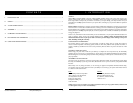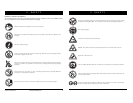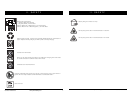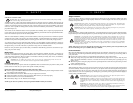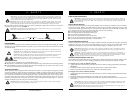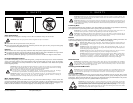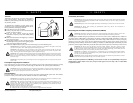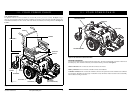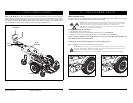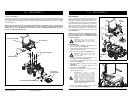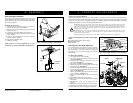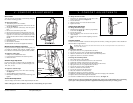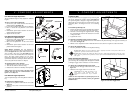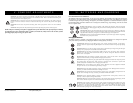
Quantum 610 Series www.pridemobility.com 13
Figure 2. Correct Curb Approach Figure 3. Incorrect Curb Approach
II. SAFETY
Stairs and Escalators
Power chairs are not designed to travel up or down stairs or escalators. Always use an elevator.
WARNING! Never use your power chair to negotiate steps or escalators.
Doors
Determine if the door opens toward or away from you.
Drive your power chair gently and slowly forward to push the door open. Or drive your power chair gently
and slowly backward to pull the door open.
Elevators
Modern elevators have a door edge safety mechanism that, when pushed, reopens the elevator door(s).
If you are in the doorway of an elevator when the door(s) begin to close, push on the rubber door edge or allow
the rubber door edge to contact the power chair and the door will reopen.
Use care that pocketbooks, packages, or power chair accessories do not become caught in elevator doors.
Lift Systems/Elevation Products
If you will be transporting your power chair during travel, you may find it necessary to use a vehicle-mounted lift
system or elevation product to aid in transportation. Pride recommends that you closely review the warnings,
instructions, specifications, and safety information set forth by the manufacturer of the lift/elevation product
before using that product.
WARNING! Not all lift systems/elevation products are rated for use with an occupied mobility
device. Pride recommends that you do not remain seated in your power chair when it is being
used in connection with any type of lift system/elevation product unless:
That product is rated for occupied use by the manufacturer.
You are able to occupy your mobility device in strict conformity with the warnings,
instructions, specifications, and safety guidelines set forth by the manufacturer.
WARNING! Always turn off the power to the controller when you are being transferred via an
elevation product. Failure to do so may result in accidental joystick contact, resulting in
unintended movement and personal injury or product damage.
Motor Vehicle Transport
Pride recommends that you do not remain seated in your power chair while traveling in a motor vehicle. The
power chair should be stowed in the trunk of a car or in the back of a truck or van with batteries removed and/or
properly secured. In addition, all removable power chair parts, including the armrests, seat, front riggings, con-
troller, and shrouds should be removed and/or properly secured during motor vehicle transport.
14 www.pridemobility.com Quantum 610 Series
WARNING! Pride does not recommend using the power chair as a seat in a motor vehicle. The
power chair user should transfer into the vehicle seat and use the vehicle-installed belt restraint
system if and whenever feasible.
WARNING! Always be sure your power chair and its batteries are properly secured when it is
being transported. Batteries should be secured in an upright position and protective caps should
be installed on the battery terminals. Batteries should not be transported with any flammable or
combustible items.
Positioning Belts
Your Quantum Rehab Provider, therapist(s), and other healthcare professionals are responsible for determining
your requirement for a positioning belt in order to operate your power chair safely.
WARNING! If you require a positioning belt to safely operate your power chair, make sure it is
fastened securely in order to reduce the possibility of a fall from the power chair.
WARNING! The positioning belt is not designed for use as a seat belt in a motor vehicle. Nor is
your power chair suitable for use as a seat in any vehicle. Anyone traveling in a vehicle should
be properly belted into seats approved by the vehicle manufacturer.
Batteries
In addition to following the warnings below, be sure to comply with all other battery handling information. For
more information about your power chair’s batteries, see VI. “Batteries and Charging.”
MANDATORY! Battery posts, terminals, and related accessories contain lead and
lead compounds. Wear goggles and gloves when handling batteries and wash hands
after handling.
WARNING! Power chair batteries are heavy. See specifications table. If you are
unable to lift that much weight, be sure to get help. Use proper lifting techniques and
avoid lifting beyond your capacity.
WARNING! Always protect the batteries from freezing and never charge a frozen
battery. Charging a frozen battery may result in damage to the battery.
WARNING! Connect the battery harnesses in the proper manner. RED (+) cables must
be connected to positive (+) battery terminals/posts. BLACK (-) cables must be
connected to negative (-) battery terminals/posts. Protective caps should be
installed over all battery terminals. REPLACE cables immediately if damaged.
Removable Parts
WARNING! Do not attempt to lift or move a power chair by any of its removable parts, including
the armrests, seat, front riggings, controller, and shrouds. Pride recommends use of only solid,
non-removable frame components such as power chair securement points or the rear frame
weldments to lift or move your power chair.
Preventing Unintended Movement
WARNING! If you anticipate being seated in a stationary position for an extended period of time,
turn off the power. This will prevent unexpected motion from inadvertent joystick contact. This will
also eliminate the possibility of unintended chair movement from electromagnetic (EM) sources.
Reaching and Bending
Never reach, lean, or bend while driving your power chair. If it is absolutely necessary to reach, lean, or bend
while seated on your power chair, it is important to maintain a stable center of gravity and keep the power chair
from tipping. Pride recommends that the power chair user determine his/her personal limitations and practice
bending and reaching in the presence of a qualified healthcare professional.
WARNING! Do not bend, lean, or reach for objects if you have to pick them up from the
floor by reaching down between your knees or if you have to reach over the back of the
seat. Movements such as these may change your center of gravity and the weight
distribution of the power chair. This may cause your power chair to tip.
WARNING! Keep your hands away from the tires when driving. Be aware that loose
fitting clothing can become caught in drive tires.
II. SAFETY





